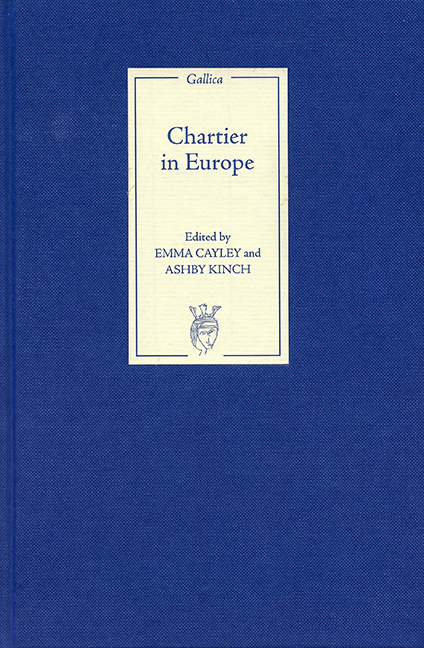Foreword
Published online by Cambridge University Press: 24 October 2017
Summary
‘Stat magni nominis umbra’ (only the shadow of the great name remains). That quotation from Lucan, which I chose to introduce my edition of Chartier's poetical works, described my view of Chartier studies as I saw them in 1974. While much had been accomplished by earlier critics as diverse as Pierre Champion, Edward Hoffman and Arthur Piaget, and by editors such as Eugénie Droz, Pascale Bourgain and François Rouy, I considered that Chartier was still too shadowy a figure, and that much more remained to be done if we were fully to understand a complex figure – poet, rhetorician, royal secretary, diplomat, polemicist, publicist – whose life was dominated by unending civil and national war, by years when the very future of his beloved France was in doubt.
Just over thirty years on, there is the clearest evidence of renewed and sustained interest in Chartier. A noteworthy feature of the many books and articles which his life and works have recently inspired is the wide range of topics addressed: Chartier's style and rhetoric; his sources, literary and historical; the impact of contemporary events on his thought and outlook; the translations of his works in prose and verse, particularly into English; the surviving manuscripts and early printed editions, whether of Chartier's own works or of those inspired by him. Chartier in Europe follows in that tradition, rightly so: its eleven chapters, all by distinguished scholars, are diverse in their subject-matter and yet complementary in the light that they cast on an author who has deservedly been called “le pere de l'eloquence françoyse” (Pierre Fabri, 1521).
Emma Cayley and Ashby Kinch are to be congratulated warmly on taking this welcome initiative. It is for me a great honour and a pleasure to have been asked to introduce the collection of essays which they have edited. I am sure that I will not be alone in hoping that this volume will be followed by others which will similarly bring Chartier out of the shadows and further into the light.
- Type
- Chapter
- Information
- Chartier in Europe , pp. viiPublisher: Boydell & BrewerPrint publication year: 2008

